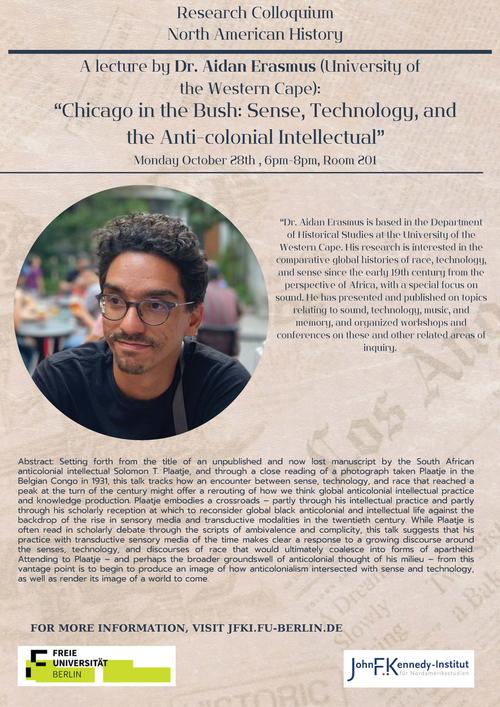Research Colloquium: Lecture by Dr. Aidan Erasmus: "Chicago in the Bush: Sense, Technology, and the Anti-Colonial Intellectual"
Abstract:
Setting forth from the title of an unpublished and now lost manuscript by the South African anticolonial intellectual Solomon T. Plaatje, and through a close reading of a photograph taken Plaatje in the Belgian Congo in 1931, this talk tracks how an encounter between sense, technology, and race that reached a peak at the turn of the century might offer a rerouting of how we think global anticolonial intellectual practice and knowledge production. Plaatje embodies a crossroads – partly through his intellectual practice and partly through his scholarly reception -- at which to reconsider global black anticolonial and intellectual life against the backdrop of the rise in sensory media and transductive modalities in the twentieth century. While Plaatje is often read in scholarly debate through the scripts of ambivalence and complicity, this talk suggests that his practice with transductive sensory media of the time makes clear a response to a growing discourse around the senses, technology, and discourses of race that would ultimately coalesce into forms of apartheid. Attending to Plaatje – and perhaps the broader groundswell of anticolonial thought of his milieu – from this vantage point is to begin to produce an image of how anticolonialism intersected with sense and technology, as well as render its image of a world to come.
Biography:
Dr. Aidan Erasmus is based in the Department of Historical Studies at the University of the Western Cape. His research is interested in the comparative global histories of race, technology, and sense since the early 19th century from the perspective of Africa, with a special focus on sound. He has presented and published on topics relating to sound, technology, music, and memory, and organized workshops and conferences on these and other related areas of inquiry. Most recently, he has co-edited a special issue of Kronos: Southern African Histories on the question of sound and historical method with Valmont Layne. He is currently working on a book manuscript, provisionally titled Sensing the World: Sound Repertoires, the Intellectual, and Practicing Freedom, whichtracks the interpretive role of sound in global black intellectual life in the technological and sensorial context of the late nineteenth and early twentieth centuries through the life and work of the South African intellectual, Solomon T. Plaatje. He co-convenes the Sound Working Group at the Iyatsiba Lab at the Centre for Humanities Research at the University of the Western Cape, a research group drawing together artists and scholars in thinking sound as aesthetic medium. Through this work, he has been involved in OSCILLATIONS: Sonic Inquiries and Practices, a successful sound art residency and exhibition project between Cape Town and Berlin in partnership with Akademie Der Künste, Centre for Humanities Research at the University of the Western Cape, and Deutschlandfunk Kultur/Klangkunst. He has also participated in several collaborative research groups such as the Forensic History Group at the University of the Western Cape, The (in)Audible Past research project convened by the University of Fort Hare and the University of Basel, and several other collaborative projects with local and international scholars and artists. As a lecturer, he teaches courses in African history and historiography, including a senior undergraduate course titled ‘Making Sense: Sight, Sound, Technology, and Race in African History’ that inducts students into both research and practice-based explorations of the history of sight and sound reproduction technologies in Africa.

